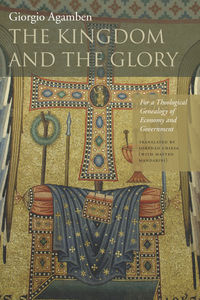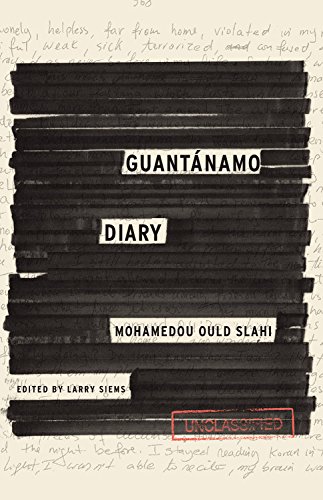
. . . We live in an age of terror, but not because we have been terrorized by the Other. Rather, the terrorism we recognize is the consequence of an a priori distinction between lives that matter and lives that don’t. Slahi, confined at Guantanamo since January 2000 without charge, represents the figure of terror.

One of the most important tasks for political theologians today is the cultivation of capacities for democratic reasoning about exceptions to the rule of law. The task is important because liberal societies face – or at least believe they face – a number of threats that seem to require exceptional measures in response. The pressure to make exceptions grows stronger, even as we find ourselves with fewer and weaker resources for thinking about them.
The recent interest shown in religion and, specifically, Christianity, by otherwise non-religious thinkers has been something of a boon for theologians and the like-minded. Even when such non-Christian appropriations of theology offer a presentation of Christianity radically different from received orthodoxy, the very fact that the effort has been made is often taken as a signal of the continuing preeminence of a largely traditional Christian thought and practice. As Paul J. Griffiths has suggested, such thinkers, left without any other viable critical options, are “yearning for [the] Christian intellectual gold” that the church has always held in reserve. Because of this, their services can easily be enlisted for theology, since, as John Milbank has often suggested, it is theology alone that offers any real alternative.
Such readings of this so-called post-secular “turn to religion,” however, tend to move too quickly to theology, and this is especially the case with Agamben. Although some may wonder if Agamben’s putative appreciation of theology means that he is in fact a Christian, his various forays into theology—notably, The Time that Remains and, more recently, The Kingdom and the Glory—present, I suggest, a much different picture. Specifically, among other things Agamben’s reading of the theological tradition represents a concerted effort to profane that tradition, to render it inoperative for a new use, a use that I characterize as non-non-theological or non-non-Christian….
The reader of the first three volumes of Agamben’s Homo Sacer series—the eponymous first volume, State of Exception, and Remnants of Auschwitz—could be forgiven for being skeptical. Though Agamben’s meditations on the question of sovereignty had an immediate purchase during the dark days of the Bush Administration, it could sometimes seem that he was guilty of stretching the concepts of the sovereign exception and bare life to the breaking point, forcing them to take on an explanatory burden they could not really bear. One could concede that when pushed to a certain extreme, the Western theologico-political machine breaks down into the confrontation of sovereign power and bare life, and perhaps even that the Western machine operates within the tension between the two—yet there is so much going on in that “between” that it seems impossible that it can all be accounted for in Agamben’s terms…
Over the summer posts on this blog have discussed Giorgio Agamben’s The Kingdom and the Glory. Longer versions of some of these posts will be featured in an upcoming issue of the print version of Political Theology.
Here are links to each of the online contributions to the symposium: […]
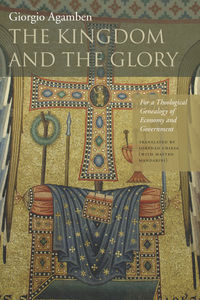
It is perhaps inevitable that the claims of a thinker such as Agamben should be profoundly annoying to those firmly rooted in a hardcore “historical materialist” perspective. Despite the fact that Marx himself was consistently fascinated with religious and theological matters insofar as they reflected the material arrangements of society, his followers, disregarding his own admonitions on dogmatism, have too often succumbed to a reflexive disdain for any analysis redolent of ‘spirit.’ And if Agamben’s claims are arguably exaggerated, then the same could also be said of the claims of his more vehement detractors. […]
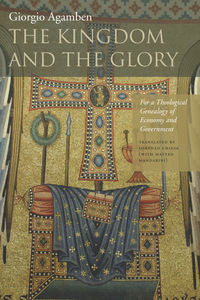
Hollywood and academia may not often be thought of in one breath, but they do share some things, not the least being a hyperventilating and parochial culture of celebrity. Having been in this business now for a few of these cycles, I’ve seen ‘em come and I’ve seen ‘em go. Which figures are selected to be smiled upon by the fame machine seems almost random, a matter of tuche, the semi-theological bad luck of those who are selected, by a blind fate, or an erratic Greek deity. The perduring and valuable work of genuine scholars mounts in height and depth gradually over decades, chiseled out of serious matter, and their import is often recognized only in retrospect, late in a career or after the author is dead. Others—the academic version of one hit wonders—flash up in an instant, are talked about—though not as often talked to, and still less often carefully read—for a frenzied spasm of a few years, then are dropped like an empty foil bag of chips, left to blow heedlessly among the trees in the groves of academe, or to wander the halls of academic conferences, for decades to come.
I’m afraid, but I’m quite sure, that the work of Agamben falls into the celebrity category. […]
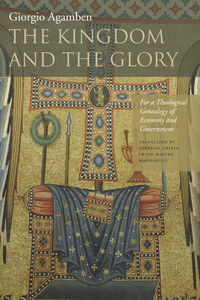
Glory doesn’t work. Amen.
This condensed assertion and acclamation get at the heart of Giorgio Agamben’s The Kingdom and the Glory, the second part of the second part of his Homo Sacer project (whose volumes include Homo Sacer, State of Exception, and Remnants of Auschwitz). The Kingdom and the Glory’s subtitle, For a Theological Genealogy of Economy and Government, allusively explains the Foucaultian-feeling rhythms according to which this text pulses—rhythms that animate the Homo Sacer project from its inception but which come to archaeological fruition in The Kingdom and the Glory. In Foucaultian fashion, The Kingdom and the Glory’s initial six sections trace a meticulous, albeit particular, conceptual genealogy through early and medieval Christian theologies (a genealogy replete with long quotations that serve as evidential support) whose impetus comes, indirectly, from an intertextual conversation between Erich Peterson and Carl Schmitt, which recurs throughout Agamben’s text. More directly, the impetus comes from Agamben’s explicit aim of catching, via theology, “a glimpse of something like the ultimate structure of the governmental machine of the West in the relation between oikonomia and Glory” (xii)—a relation he casts in State of Exception in terms of auctoritas and potestas. […]


